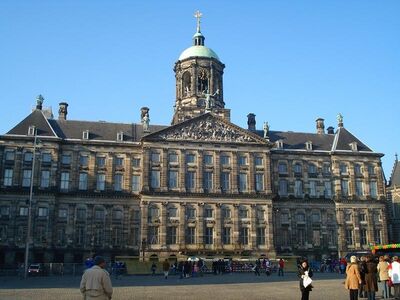Palace of Magnaura: Difference between revisions
(Created page with "The '''Palace of Magnaura''' serves as the meeting place for the Senate, the Curia, the Chamber of Plebeians, and the Centuriate Assembly, the four houses of the Parliament...") |
|||
| (3 intermediate revisions by the same user not shown) | |||
| Line 1: | Line 1: | ||
The '''Palace of Magnaura''' serves as the meeting place for the Senate, the Curia, the Chamber of Plebeians, and the Centuriate Assembly, the four houses of the [[Parliament of Mesogeia]], collectively known as the '''Houses of Parliament. | [[File:Magnaura Palace.jpg|400px|thumb|right|The Magnaura Palace.]] | ||
The '''Palace of Magnaura''' serves as the meeting place for the [[Senate of Mesogeia|Senate]], the [[Curia]], the [[Chamber of Plebeians]], and the [[Centuriate Assembly]], the four houses of the [[Parliament of Mesogeia]], collectively known as the '''Houses of Parliament. | |||
Its name derives from the fact that it once served as the Great Hall of the Imperial Palace of Alexandropolis. Even after not being inhabited by any monarch for several centuries it retains its original status as an imperial residence. From at least the eighth century, the houses of parliament were assembled here for the annual ceremony known as the silention. For several centuries the palace's throne hall served as a reception hall for foreign embassies. | Its name derives from the fact that it once served as the Great Hall of the Imperial Palace of Alexandropolis. Even after not being inhabited by any monarch for several centuries it retains its original status as an imperial residence. From at least the eighth century, the houses of parliament were assembled here for the annual ceremony known as the silention. For several centuries the palace's throne hall served as a reception hall for foreign embassies. | ||
| Line 5: | Line 6: | ||
The Magnaura Palace alongside the Imperial Palace is one of the centres of politics in Mesogeia, with its name becoming a metonym for the Imperial Parliament and the Mesogeian government as a whole. | The Magnaura Palace alongside the Imperial Palace is one of the centres of politics in Mesogeia, with its name becoming a metonym for the Imperial Parliament and the Mesogeian government as a whole. | ||
==History== | ==History== | ||
==Exterior== | ==Exterior== | ||
The Palace of Magnaura is noted for its imposing sandstone façade. | |||
==Interior== | ==Interior== | ||
The Palace of Magnaura contains over 1,367 rooms, spread over four stories. The ground floor consists of offices for members of parliament; the first floor contains the main rooms of the palace, including the four chambers of parliament the lobby, and the library of parliament. The top two floors houses further offices and committee rooms. | The Palace of Magnaura contains over 1,367 rooms, spread over four stories. The ground floor consists of offices for members of parliament; the first floor contains the main rooms of the palace, including the four chambers of parliament the lobby, and the library of parliament. The top two floors houses further offices and committee rooms. | ||
===Imperial Vestibulum=== | |||
The Imperial Vestibulum is the grandest entrance in the entire palace, it is also reserved exclusively for the arrival of the Emperor during the silention, the annual opening of parliament. | |||
===Basileus Room=== | |||
===Imperial Gallery=== | |||
===Senate Chamber=== | |||
===Boule Chamber=== | |||
===Grandee Atrium=== | |||
===Celestial Atrium=== | |||
===Peoples Atrium=== | |||
===Chamber of the Poleis=== | |||
===Chora Assembly Chamber=== | |||
===Great Hall=== | |||
[[category:Palaces in Mesogeia]] | [[category:Palaces in Mesogeia]] | ||
Latest revision as of 23:03, 14 October 2021
The Palace of Magnaura serves as the meeting place for the Senate, the Curia, the Chamber of Plebeians, and the Centuriate Assembly, the four houses of the Parliament of Mesogeia, collectively known as the Houses of Parliament.
Its name derives from the fact that it once served as the Great Hall of the Imperial Palace of Alexandropolis. Even after not being inhabited by any monarch for several centuries it retains its original status as an imperial residence. From at least the eighth century, the houses of parliament were assembled here for the annual ceremony known as the silention. For several centuries the palace's throne hall served as a reception hall for foreign embassies.
The Magnaura Palace alongside the Imperial Palace is one of the centres of politics in Mesogeia, with its name becoming a metonym for the Imperial Parliament and the Mesogeian government as a whole.
History
Exterior
The Palace of Magnaura is noted for its imposing sandstone façade.
Interior
The Palace of Magnaura contains over 1,367 rooms, spread over four stories. The ground floor consists of offices for members of parliament; the first floor contains the main rooms of the palace, including the four chambers of parliament the lobby, and the library of parliament. The top two floors houses further offices and committee rooms.
Imperial Vestibulum
The Imperial Vestibulum is the grandest entrance in the entire palace, it is also reserved exclusively for the arrival of the Emperor during the silention, the annual opening of parliament.
